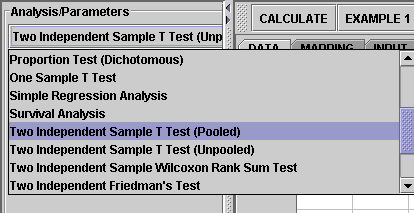Difference between revisions of "SOCR EduMaterials AnalysisActivities TwoIndepT"
(→Two Independent Sample T-Test Example) |
|||
| (3 intermediate revisions by 3 users not shown) | |||
| Line 1: | Line 1: | ||
| − | ==Two Independent Sample T-Test Background== | + | ==[[SOCR_EduMaterials_AnalysesActivities | SOCR Analysis]] - Two Independent Sample T-Test Background== |
| − | |||
| − | ==Two Independent Sample T-Test Example== | + | Given two groups of data, not necessarily with same sample size, we'd like to test the null hypothesis that the two groups have equal mean. This is a parametric test. |
| − | We will demonstrate Two Independent T-Test with a SOCR built-in example. | + | |
| + | ==Two Independent Sample T-Test Example (Pooled Sample Variance) == | ||
| + | Go to the [http://www.socr.ucla.edu/htmls/ana/TwoIndependentTTest_Analysis.html SOCR Two Independent Sample T-Test Applet]. We will demonstrate Two Independent T-Test with a SOCR built-in example. | ||
This example is based on the data taken from "Mathematical Statistics and Data Analysis" by John A. Rice, Second Edition, Ducbury Press, 1995. (Page 390) | This example is based on the data taken from "Mathematical Statistics and Data Analysis" by John A. Rice, Second Edition, Ducbury Press, 1995. (Page 390) | ||
Here's the steps of the activity: | Here's the steps of the activity: | ||
| − | '''1.''' Click on '''Two Independent Sample T-Test''' at the left panel's combo box. | + | '''1.''' Click on '''Two Independent Sample T-Test (Poored)''' at the left panel's combo box. |
<center>[[Image:SOCR_AnalysisActivities_TwoIndepT_Chu_051707_Fig1.gif|700px]]</center> | <center>[[Image:SOCR_AnalysisActivities_TwoIndepT_Chu_051707_Fig1.gif|700px]]</center> | ||
| Line 20: | Line 21: | ||
| − | '''2.''' Click on the "'''Mapping'''" button to get to the "'''Mapping'''" panel. Click on '''"ADD"''' under '''VARIABLE 1''' and to add '''A''', and click on '''ADD''' under '''VARIABLE 2''' to add '''B'''. This will add the variables for Two Independent Sample T-Test. We care about the difference, so which on goes to '''VARIABLE 1''' or '''VARIALBE 2''' is arbitrary. Here, the computer will set difference = Variable 2 - Variable 1. If you like the | + | '''2.''' Click on the "'''Mapping'''" button to get to the "'''Mapping'''" panel. Click on '''"ADD"''' under '''VARIABLE 1''' and to add '''A''', and click on '''ADD''' under '''VARIABLE 2''' to add '''B'''. This will add the variables for Two Independent Sample T-Test. We care about the difference, so which on goes to '''VARIABLE 1''' or '''VARIALBE 2''' is arbitrary. Here, the computer will set difference = Variable 2 - Variable 1. If you like the subtraction to go the other way around, simple assign '''VARIABLE 1''' and '''VARIABLE 2''' in the opposite way. |
Latest revision as of 15:16, 23 January 2009
SOCR Analysis - Two Independent Sample T-Test Background
Given two groups of data, not necessarily with same sample size, we'd like to test the null hypothesis that the two groups have equal mean. This is a parametric test.
Two Independent Sample T-Test Example (Pooled Sample Variance)
Go to the SOCR Two Independent Sample T-Test Applet. We will demonstrate Two Independent T-Test with a SOCR built-in example. This example is based on the data taken from "Mathematical Statistics and Data Analysis" by John A. Rice, Second Edition, Ducbury Press, 1995. (Page 390)
Here's the steps of the activity:
1. Click on Two Independent Sample T-Test (Poored) at the left panel's combo box.


On the right panel, first click on EXAMPLE 1 and next click on "Data" to retreive the demonstrated example. This is the example we'll be looking at.

2. Click on the "Mapping" button to get to the "Mapping" panel. Click on "ADD" under VARIABLE 1 and to add A, and click on ADD under VARIABLE 2 to add B. This will add the variables for Two Independent Sample T-Test. We care about the difference, so which on goes to VARIABLE 1 or VARIALBE 2 is arbitrary. Here, the computer will set difference = Variable 2 - Variable 1. If you like the subtraction to go the other way around, simple assign VARIABLE 1 and VARIABLE 2 in the opposite way.

3. Click on "Calculate" then click on "Result" to see the results.

Questions for students: By looking at the test results, what do you think about the data? What can you say about the two different shoe materials?
Translate this page: